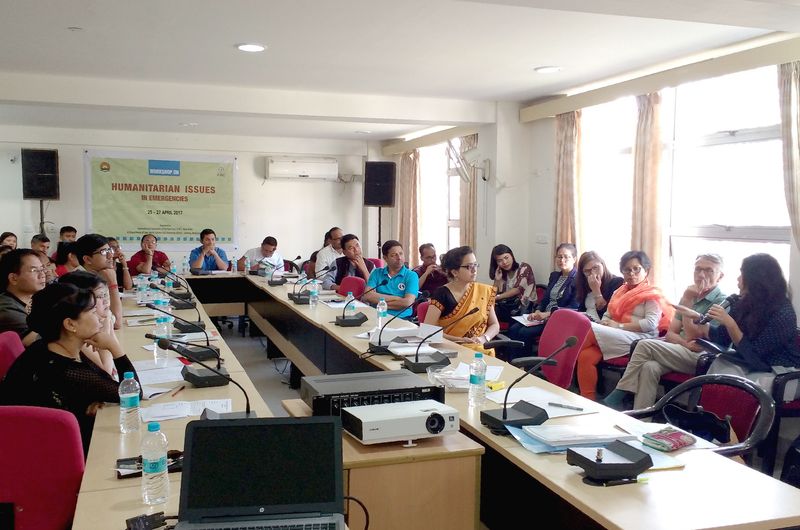Contributed by Ms. Dristirupa Patgiri, Assistant Professor at Department of Juridical Studies, Mahapurusha Srimanta Sankaradeva Viswavidyalaya (MSSV), Nagaon, Assam
The three-day workshop for teachers on ‘humanitarian issues in emergencies’ organized by the ICRC New Delhi regional delegation – in collaboration with the Department of Law, North-Eastern Hill University in Shillong – was one of a kind. It comprised not only lectures and discussions, but also working group assignments focusing on the need to give primary attention to humanitarian issues in any kind of emergency situations, be it armed conflict or natural disasters.
The participating teachers came from backgrounds as diverse as political science, mass communication and journalism, international relations and law, and facilitators meticulously presented issues in a manner that was comprehensible to all. The scope and relevance of International Humanitarian Law was emphasised, along with the need for humanitarian diplomacy. We were introduced to the ICRC’s approach to humanitarian assistance, especially to vulnerable groups such as minors, people with disability and elders in different contexts.
Dr. Maria Guevara of Médecins Sans Frontières (MSF) highlighted the ground realities of working in the field and explained why being neutral has become one of the key concerns for the organisation even as it continues to exercise agency when countered. Her anecdotes of working in Myanmar were particularly insightful. Mr. Rene Boeckli, deputy head of the ICRC in New Delhi, conducted a session on stress management in the field, which proved to be of universal importance and gave the participants an opportunity to dwell on a subject that is often acknowledged as a part of daily life but rarely discussed.

Ms. Diana E. Kharshiing, General Secretary, Meghalaya branch of the Indian Red Cross Society, addressing the parrticipants. ©ICRC
Ms. Diana E. Kharshiing, General Secretary, Meghalaya branch of the Indian Red Cross Society, talked about the stigma around blood donation, which has been a persisting issue in the region. She explained that only 42% of the region’s blood requirements are fulfilled by donors in the State. Ms. Diana responded to queries on volunteering with the organization individually as well as via an institution. Ms. Patricia Mukhim, senior journalist from Meghalaya, provided us a better understanding of how different stakeholders in the media play a role in emergency situations and how certain information and communication technology (ICT), viz. smartphones and live-streaming, have impacted journalism.
The issues highlighted with regard to Meghalaya sparked interest among the participants and elaborate discussions followed the sessions. Those from the region gave inputs regarding the concerns around blood donation and enlightened the audience regarding the fear of injections and the perception that blood donation is equivalent to becoming a blood relative. For instance, a husband would not want to donate blood to his wife. Lack of education and existing belief systems were considered to be the primary factors.
The workshop provided a platform to discuss potential collaborations to conduct similar workshops on humanitarian action in emergency situations. As a faculty member of law I hope to conduct a session on emergencies and the role of the ICRC in my department in MSSV, Assam in the near future.


